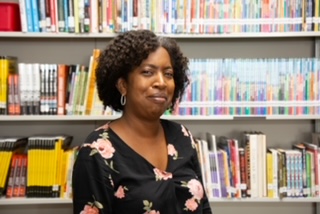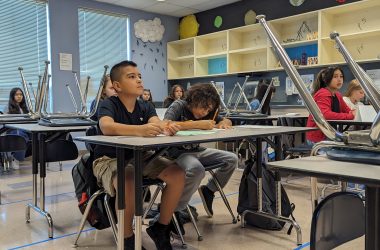This article was originally published by Pamplin Media Group and is reprinted here with permission. Read the Class of Covid series here.
Azriel Chavez, an 18-year-old at Early College High School at Chemeketa Community College, assumed the worst when schools and most public places shut down in March 2020.
“I thought I was screwed,” Chavez said. “Almost everybody in my family is immunocompromised, so that was really scary to me.”
Transitioning from in-person to comprehensive distance learning was difficult for the Salem teen. They had trouble focusing in their home environment and found it difficult to shift to a school mindset amid other demands for their time.
Due to circumstances within her large family, Chavez is the only older sibling in the household able to take care of younger siblings and perform chores.
Along with managing Zoom classes and work, Chavez needed to babysit siblings Luna, who was 5 at the time, and Xander who was 2. Luna was about to start kindergarten, via Zoom.
“I’ve always had to babysit my siblings, but it had never been to the extreme during quarantine,” Chavez said.
In addition to being scared about bringing Covid home to the family, Chavez also worried about their future plans. They had hoped to use sophomore year to explore interests, but on top of distance learning, in late 2020, Chavez’s family was hit with a major curveball. Due to plumbing issues, the family had to abruptly move into a hotel from December 2020 to February 2021.
Chavez was unable to pursue any interests outside of family and school during that time, but it did lead to more self-exploration and reflection. Chavez had previously identified as a guy and was unsure of their sexuality. Now, they say they fully understand who they are and where they’re going.
Quarantine affected more than just academic learning and pursuing their interests. Since 7th grade, Chavez had volunteered at the Nightmare Factory, a haunted house on campus of the Oregon School for the Deaf in Salem. Their parents acted in the haunted house too, so volunteering was a big part of their October. But for two years, the Nightmare Factory was unable to open.
“It felt like a piece was missing, like getting cut off from family,” Chavez said.
Fortunately, the Nightmare Factory reopened in 2022, and Chavez was able to take part in the haunted house once more.

The Nightmare Factory is a big creative inspiration to Chavez in acting and filmmaking. Chavez wanted to create stories since they were little, but it wasn’t until sophomore year that they realized they wanted to be a filmmaker.
They took a film arts class during junior year, and they’re currently taking another this year. Part of the early college program involves taking real college classes and high school classes. Now a senior, Chavez transitioned to only taking college classes except for one college prep class.
Despite Covid-related school and home life disruptions, Chavez has created three short films and is currently working on a fourth, which is about a photography student looking for the perfect model and another person looking for true love. They’re in the script-writing stages now, but they already have actors and sets in mind.
Chavez plans to pursue filmmaking after high school. They’re hoping to get into New York University, California Institute of the Arts or the University of California, Los Angeles. Along with establishing a portfolio, they’ve also applied for various scholarships and aim to apply for more.
After film school, Chavez’s main goal is to create films about LGBTQ+ or POC communities. The high school senior wants to interview people who don’t typically have stories written about them and create films about their lives and their community. Chavez also wants to create movies that include marginalized and underrepresented characters, even if they’re not central to the script.
“I think the film world is very white-centric and straight-centric, and I think that limits the creative world because we’ve only had one perspective of ideas,” Chavez said. “In order to increase creative ideas, you need to branch out to people who are not white and people who are not straight.”
The global pandemic was an obstacle in filmmaking, but not one that halted their passion. The pandemic made scheduling times to film more difficult and limited options for sets. Chavez’s first film was shot outside so they didn’t have to risk obscuring the audio by wearing masks. To protect their family, Chavez could worked only with people who were vaccinated.
Chavez said that being quarantined at home taught them how to cope and bounce back, while finding a clear sense of identity and forging a creative path toward the future.
Kalia Yee is a student journalist attending Salem-Keizer Early College High School. This story is part of Pamplin Media Group’s “Class of COVID” series and is a project of Amplify, a community storytelling initiative of Pamplin Media Group and Care Oregon. Amplify supports internships and special projects for high school journalists in the Portland metro region and aims to elevate the voices of students from historically underrepresented groups, such as communities of color, low-income residents and others.










